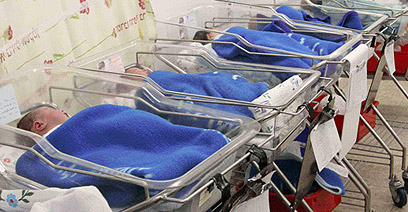In Israel, the fertility rate among Jewish women is rising while birthrate in the Muslim sector drops, according to latest demographics report.
Yaron Druckman
According to a demographics report released by the Central Bureau of Statistics (CBS) on Monday, the State of Israel has a population of 7,836,600, of which 75.4% is Jewish.

Population growth – Photo: Shiran Granot
The data, which was compiled for 2011, also indicates that Jewish births are on the rise, while Arab and Druze births are decreasing.
According to forecasts, by the end of 2035 the number of Jews is expected to be somewhere between 7.7-9.9 million and the Arab population is to total between 2.3-2.9 million.
In 1995, the average number of births per Jewish woman in Israel stood at 2.53, rising to 2.98 in 2011. In the Muslim sector, the fertility rate dropped from 4.74 in 2000 to 3.51 in 2011.
The Druze birthrate has decreased even more dramatically. In 1965, Druze woman birthed an average of 7.61 children on average, while last year that number stood at 2.33.
The Jewish birthrate increased by 1.7% per year as opposed to 2.5% in the Muslim sector. The Muslim population’s growth rate is on a decline, as it stood at 3.8% 13 years ago.
In 2011, 166,296 Israeli babies were born, of which 73% were born to Jewish women, 21% were born to Muslim women, 3% to women with no religious classification, 2% were born to Druze women and about 1% to Christian Arab women.
The Israeli population increased by 1.8% last year – an addition of 141,500 people. About 125,500 people were added naturally, meaning the number of births minus the number of deaths, and about 16,600 were added as result of international immigration – the number of immigrants who arrived in Israel minus the number who left the Jewish state.
Happy 80th
Israeli life expectancy is also on the rise. In 2035, every seventh Israeli is expected to be over the age of 65. According to OECD data for 2010, Israeli men rate second in life expectancy among member nations, with 79.7 years, alongside Japan, where men live 79.6 years on average. Switzerland, where men live to the age of 80.6, is first on the list.

Israeli baby boom – Photo: Ido Erez
Men in Sweden, Iceland and Australia have a similar life expectancy to males in Israel.
Israeli women have a life expectancy of 83.6 years – three years lower than the leading country, Japan, where women live to the age of 86.4 on average.
Women in Australia, Finland, Austria, South Korea, Iceland, Sweden and Luxembourg have a similar life expectancy to Israeli females.
The data shows that the life expectancy in 2011 was up 8.6 years amongst men and by 8.9 years amongst women compared to 1975.
The increase is credited in part to the drop in deaths amongst 45 to 74-year-olds. A drop in the number of infant deaths within the Arab population has contributed as well.
Throughout the years, the life expectancy of the Arab population has been lower than that of the Jewish population – men and women alike.
Until the end of the 1980s, the life expectancy gap between Jews and Arabs was shrinking and in the years 1985-1989 it stood at 1.4 years amongst men and 2.3 years amongst women. Since then, in the years 2010-2011, the gap has increased to 3.9 years amongst men and 3.0 years amongst women.
And what about immigration? In the year 2011, 16,892 new immigrants arrived in Israel. About 43% of the immigrants were born in the former Soviet Union, about 15% were born in Ethiopia, roughly 14% in the United States and about 9% in France.
View original Ynet publication at: http://www.ynetnews.com/articles/0,7340,L-4332386,00.html






 Israeli New Shekel Exchange Rate
Israeli New Shekel Exchange Rate